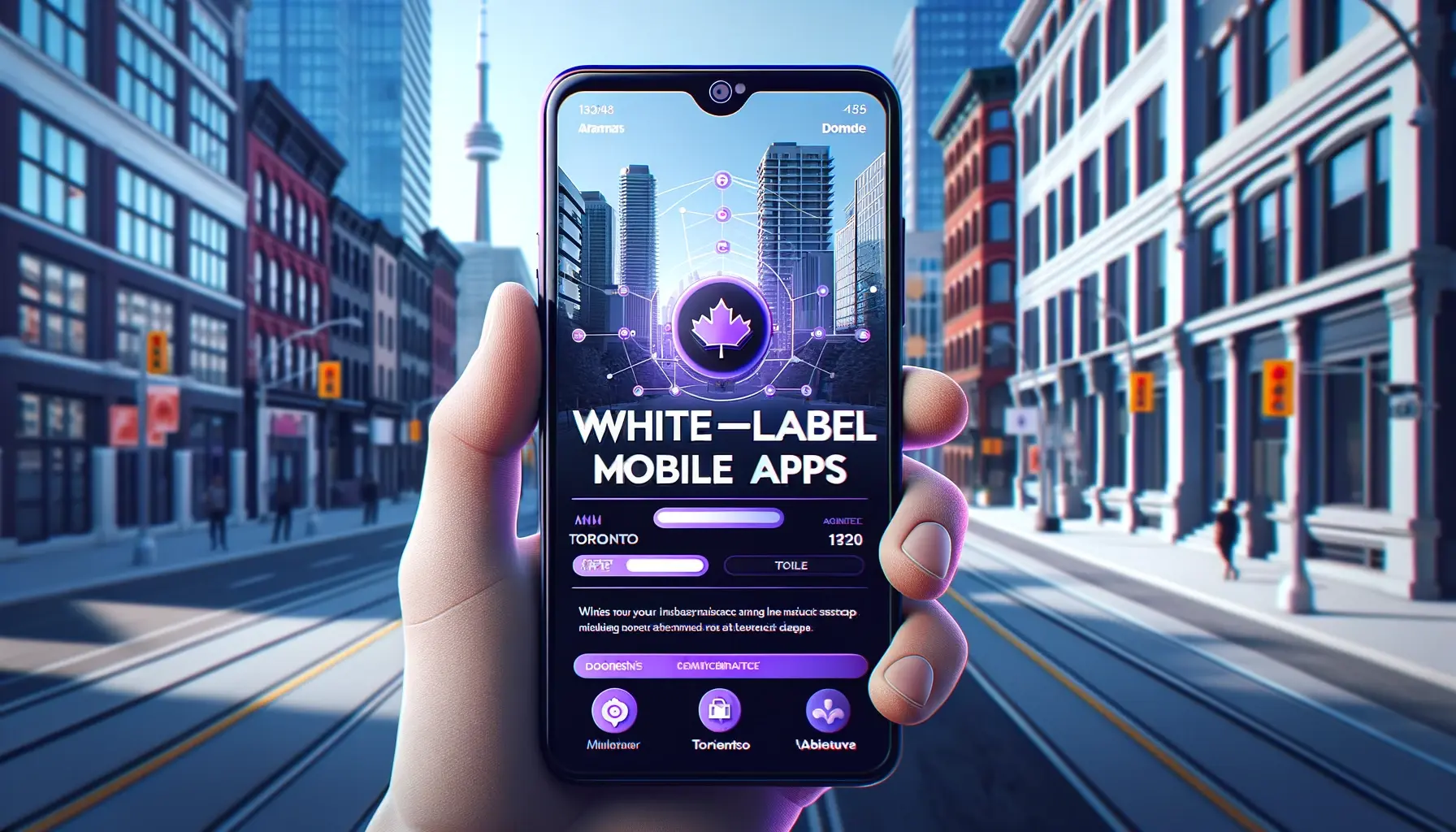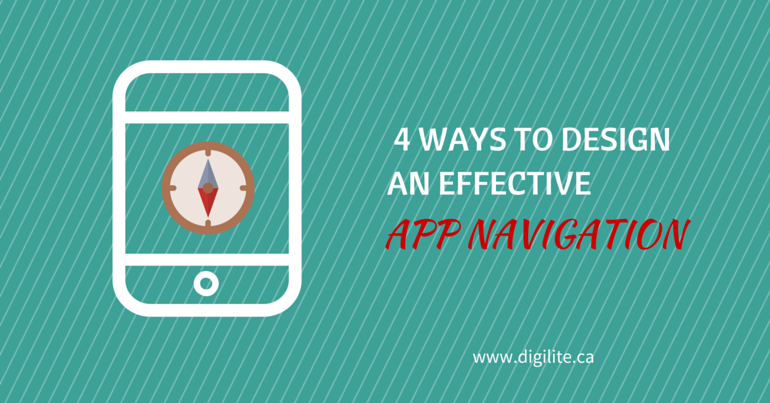Mobile applications have become the driving force behind business innovation and growth. With impressive statistics painting a promising picture, it’s clear that businesses that harness the power of mobile apps are poised for success.
By 2025, revenue from mobile apps is expected to surge across various industry segments, reaching an incredible total of approximately $613 billion. Furthermore, as we finalize 2023, mobile apps are predicted to generate revenue exceeding an impressive $935 billion. These figures are nothing short of a testament to the transformative potential of mobile applications.
But here’s the catch: the combined number of mobile apps available on the Google Play Store and Apple App Store already surpasses a staggering 5.7 million. This demonstrates not only the popularity of mobile apps but also the intense competition businesses face to stand out in this crowded digital marketplace.
Now, envision a world where your business can launch its own custom app, finely tuned to meet the specific needs of your industry. Imagine doing so without the hassles of lengthy development timelines or the financial burden of starting from scratch. This is where white-label mobile app solutions step in – the ultimate secret weapon for businesses looking to not just keep pace but leap ahead in the digital race.
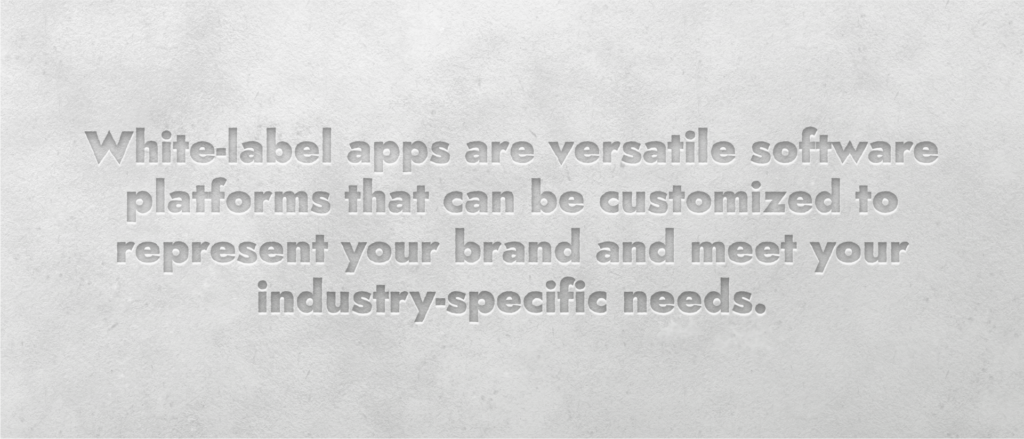
What is a White-Label App?
At their core, white-label apps are like chameleons. They have a unique ability to adapt and blend seamlessly into your business environment. Think of them as ready-to-use software platforms that are versatile and highly customizable. It’s similar to purchasing a beautifully designed house; it comes with a solid structure and a canvas for your personal touch to transform it into a true home.
They form the cornerstone of establishing your digital presence, providing pre-built, feature-rich applications that flexibly mould to your brand’s identity and industry-specific needs. Their adaptability and customization offer a diverse range of functionalities tailored to your business’s individuality.
Much like how you decorate your house to reflect your style, you can customize a white-label app to align perfectly with your brand’s essence. From the colour scheme to the user interface, these apps can be adorned with your company’s signature elements, making them feel like a natural extension of your business.
In essence, white-label app solutions are your digital canvas, ready to be painted with your brand’s colours and tailored to suit your industry’s needs. They offer a cost-effective, time-saving, and highly adaptable solution for businesses looking to enter the digital landscape without the complexities of starting from scratch.
Top Benefits of White-Label App Solutions
White-label apps offer a wide range of advantages that can revolutionize your business operations and customer interactions.
- Scalability: These applications ensure scalability by accommodating growing user bases and increased demand, allowing businesses to expand without compromising performance. The pre-built structures offer flexibility, far from rigid templates, adapting seamlessly to evolving business needs and ensuring sustained scalability. This adaptability contributes to a positive return on investment (ROI) as businesses can efficiently scale operations without excessive costs. Additionally, the rapid deployment facilitated by pre-built structures supports fast market entry, enabling businesses to swiftly establish a presence.
- Customization Options: Businesses can personalize user interfaces, features, and branding, tailoring applications to unique needs and seamlessly integrating them into existing systems.
- Cost-Effectiveness: Opting for white-label apps reduces development costs significantly, making it an economically efficient choice for businesses seeking robust applications without the hefty price tag associated with custom development.
- Time Efficiency and Adaptability: These solutions expedite time-to-market, enabling businesses to launch their branded apps swiftly and capitalize on market opportunities before competitors. Their adaptability ensures compliance with evolving industry standards.
- Brand Consistency: The customization features allow businesses to maintain brand consistency, from colour schemes and logos to overall user experience, fostering a recognizable and trustworthy brand identity.
- Technical Support and Reduced Risk: Providers offer continuous technical support, ensuring timely assistance and benefiting from app updates. Adopting these proven solutions mitigates risks associated with untested applications.
- Focus on Core Competencies: White-label solutions enable businesses to concentrate on core competencies while leveraging specialized applications for enhanced functionality.
- Enhanced User Experience: Through customization options, businesses craft intuitive user experiences, fostering satisfaction and loyalty.
- Cross-Platform Compatibility: These apps often boast cross-platform compatibility, reaching diverse audiences across devices and operating systems, ensuring consistency and reducing development efforts.
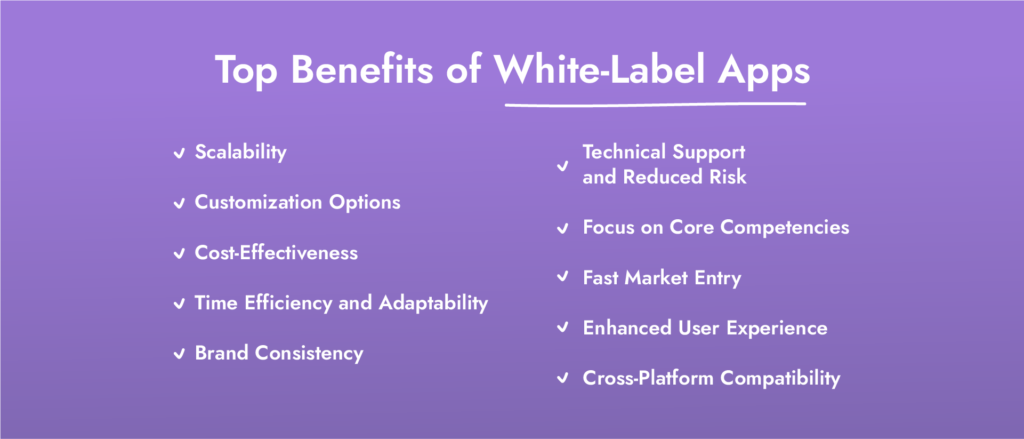
Unlocking the Potential of White-Label Apps Across Industries
These customized applications tailored to individual industries offer versatile solutions. Let’s explore their specific benefits across sectors.
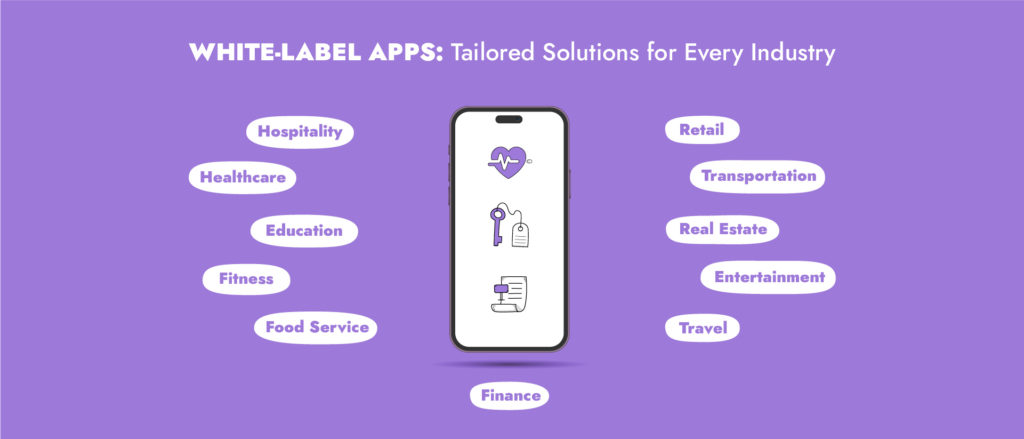
1. Retail
In the retail landscape, tailored applications serve as comprehensive shopping companions, integrating store functionalities, brand engagement, exclusive offers, and streamlined inventory management. For example, a white-label retail app might allow customers to explore a virtual store, receive personalized recommendations, and access loyalty rewards, creating a more engaging and customized shopping experience.
2. Healthcare
In the healthcare sector, these apps simplify patient management, from scheduling appointments to maintaining patient records. They bring healthcare closer to patients through telemedicine features, enabling consultations from the comfort of their homes. They also empower patients to monitor their health parameters. For instance, a healthcare mobile app could enable remote monitoring of vital signs and facilitate virtual consultations, improving accessibility and patient care.
3. Finance
White-label apps provide a user-friendly platform for banking needs, encompassing secure fund transfers and expense tracking. They offer personalized financial guidance through AI and prioritize top-tier security to safeguard users’ financial information. An example is a mobile banking app that not only enables secure transactions but also utilizes AI algorithms to provide tailored financial advice based on individual spending patterns and goals.
4. Education
Mobile education apps revolutionize learning by offering interactive courses, quizzes, and instant feedback for students. They streamline administrative tasks for educators and facilitate seamless communication among parents, students, and teachers. A white-label education app might include features like virtual classrooms, progress tracking, and communication portals, enhancing the overall learning experience.
5. Hospitality
In the hospitality industry, white-label apps enhance guest experiences by offering seamless check-in/check-out, room service requests, and local recommendations. They provide a personalized touch to each guest’s stay. For instance, a hotel app could allow guests to check-in online, order room service through the app, and receive personalized recommendations for nearby attractions.
6. Transportation
White-label apps in the transportation industry optimize travel by offering real-time updates, ticket bookings, and navigation assistance. They make commuting more efficient and user-friendly. An example is a transportation app that provides real-time bus or train schedules, allows ticket purchases, and offers navigation guidance, ensuring a smoother travel experience.
7. Real Estate
The real estate sector benefits from white-label apps by offering property listings, virtual tours, and mortgage calculators. These apps simplify property buying and renting processes. A real estate app could allow users to explore properties through virtual tours, calculate mortgage estimates, and receive notifications for new listings, streamlining the property search and transaction process.
8. Fitness
White-label apps in the fitness industry facilitate workout routines, track progress, and offer nutrition advice. They empower individuals to lead healthier lives. For instance, a fitness app might provide personalized workout plans, track exercise metrics, and offer nutritional guidance, helping users achieve their fitness goals.
9. Entertainment
In the world of entertainment, white-label apps offer a gateway to immersive experiences, from streaming services to interactive content. They keep users engaged and entertained. An entertainment app could provide access to a variety of streaming content, offer interactive games or quizzes, and tailor recommendations based on user preferences, enhancing the overall entertainment experience.
10. Travel
The travel industry benefits from white-label apps with features like travel itineraries, booking options, and real-time updates on flights and accommodations. They make traveling hassle-free. A travel app could offer itinerary planning, flight and hotel bookings, and real-time travel updates, providing users with a comprehensive and convenient travel experience.
11. Food Service
In the food service sector, white-label apps simplify ordering, delivery, and reservations. They enhance the dining experience for customers. A food service app might allow users to order food, track delivery status, and make reservations at restaurants, providing a seamless and convenient dining experience.
White-label apps are the go-to for businesses looking to make a mark. They’re not just tools; they’re the way brands showcase themselves.
In short, these custom-tailored applications, a key player in mobile app development, are the secret sauce for businesses wanting more than survival—they’re the key to leading in the digital age. It’s not about fitting in; it’s about standing out. And with these solutions, businesses can craft their unique story in the ever-evolving digital landscape.

